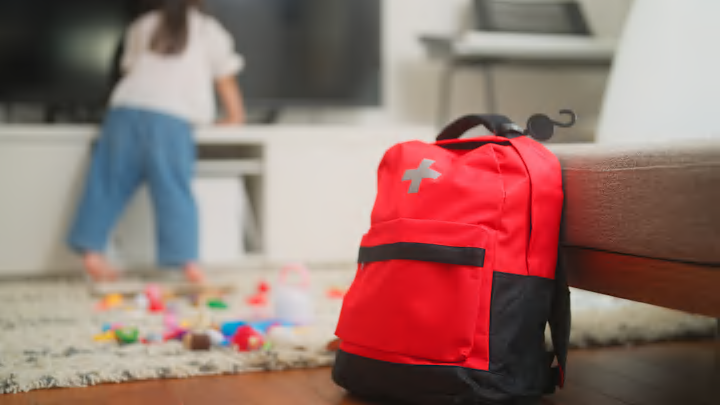Emergency preparedness is one of those things that can be easy to put off for another day. But given the wildfires raging throughout Los Angeles County in California, the importance of being ready to go at a moment’s notice in the event of a natural disaster or similar catastrophic event has never been clearer.
One way to stay safe in the midst of a sudden crisis is by packing a go-bag, meaning an emergency carryall with just-in-case supplies. A go-bag’s contents will vary according to your personal needs, but experts typically suggest including a few staple items.
- What to Pack for Food
- What to Pack for Tools and Supplies
- Should You Rely On Smartphones?
- What To Look for in a Bag
What to Pack for Food
We don’t recommend becoming a walking grocery store, but every go-bag should include at least a three-day food supply, and at least one gallon of water per person per day. That said, don’t just raid your pantry for leftover bags of chips or Lunchables and stash them in a duffel bag. Opt instead for healthy non-perishables, like pouches or cans of tuna and beans (don’t forget a manual can opener!) and protein or granola bars.
Pre-packaged nuts, trail mix, beef jerky, and peanut butter are other good options, as they have tons of energy-boosting protein. You’ll also need plenty of water for both hydration and sanitation purposes, but if you don’t want to weigh down your pack with multi-gallon bottles, consider bringing water-purifying tablets, mini-filters, or a reusable water bottle equipped with a filter.
What to Pack for Tools and Supplies
Additional go-bag items include a prepackaged first aid kit (customize it by adding your prescription medicines to the mix), an emergency whistle, a wrench or pliers (for turning off water valves, circuit boxes, and gas appliances), a flashlight and extra batteries, a battery- or hand-powered radio, and a NOAA Weather Radio with tone alert. These items are all likely available at your local big box outdoors store.
Other less obvious—but no less important—supplies include: a dust mask (it helps filter contaminated air); plastic sheeting and duct tape (to construct a makeshift shelter); and wet wipes, trash bags, and plastic ties (to stay clean and hygienic in the absence of showers and routine garbage collection).
Should You Rely On Smartphones?
In a word? No. Cell phones can be just as useful in a crisis as they are for checking social media feeds, but you should pack some old-fashioned local maps along with extra chargers and phone batteries. That way, if you lose service, you won’t be stuck relying on a malfunctioning Google Maps page to find your way.
What To Look for in a Bag
While shopping for your go-bag (it should be durable, yet lightweight), look for a large waterproof pouch to store money, credit cards, and essential documents, including copies of your passport and visas; your driver’s license; and your marriage, birth, adoption, and naturalization certificates. If you have pets or an older relative, you may also want to purchase and pack a second bag just for them.
While essential, these go-bag suggestions are by no means comprehensive. Feel free to add extra supplies, or tweak the ones above as needed. But since disasters can strike at any time, do consider packing three separate go-bags: one for home, one for work, and another for your car. Hopefully, you’ll never need them—but it’s always worth your peace of mind to have them.
Read More About Emergency Preparedness Below:
A version of this article originally ran in 2017 and has been updated for 2025.
